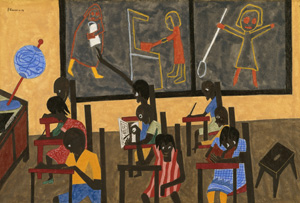“I associate chronic boredom with narcissism, ingratitude and poverty of imagination.”
Patrick Kurp, Anecdotal Evidence, May 15, 2009
Archives for May 2009
TT: An American classic in Texas
In the latest of my Wall Street Journal reports from the road, I review Main Street Theater’s revival of Awake and Sing! in Houston and Theatre Three’s revival of Lost in the Stars in Dallas. Here’s an excerpt.
* * *
Why is Clifford Odets’s “Awake and Sing!” performed so rarely? It’s one of the greatest of all American plays, a wrenching kitchen-sink drama of Depression-era family life, and by all rights it ought to be as popular as “Our Town” or “The Glass Menagerie.” But revivals of “Awake and Sing!” are few and far between–Lincoln Center Theater’s 2006 production was the first time the show had been done on Broadway since 1984–which is why I flew to Houston to see a new staging of an underappreciated masterpiece….
The special excellence of “Awake and Sing!” lies not in its standard-issue plot, whose climax is frankly melodramatic, but in Odets’s golden ear for the tangy, Yiddish-flavored everyday speech of the Russian-Jewish immigrant community into which he, like the Bergers, was born. It’s as though he’d spent his childhood with a notebook in his hand, scribbling down homely phrases that he would later use with the lapidary exactitude of a poet (“Never mind laughing. It’s time you already had in your head a serious thought”). Not until August Wilson came along a half-century later would an American playwright make such effective use of the language of the streets on which he grew up.
I confess to not having expected a stageful of Houston-based actors to speak Odets’s dialogue with the idiomatic snap that you’d take for granted from a New York cast. Was I wrong! Not only is Main Street Theater’s ensemble cast at home with every line, but they put across the play’s angry warmth so believably that you’d think you were sitting at the table with them….
Today Kurt Weill is mainly remembered for “The Threepenny Opera,” but in his lifetime he was best known for the musicals that he wrote after he immigrated to America in 1935 and retrofitted himself as a Broadway songsmith. Yet none of them has been successfully revived in New York, and Theatre Three’s production of “Lost in the Stars,” Weill’s 1949 musical version of Alan Paton’s novel “Cry, the Beloved Country,” appears to be the first full-scale staging of that show to be seen anywhere in the past two decades. I wondered whether a 60-year-old musical about life under apartheid would make sense in the 21st century, but “Lost in the Stars” proves to be a fresh and compelling piece of work that is long overdue for a second chance on Broadway.
* * *
Read the whole thing here.
TT: Almanac
“We cross our bridges when we come to them and burn them behind us, with nothing to show for our progress except a memory of the smell of smoke, and a presumption that once our eyes watered.”
Tom Stoppard, Rosencrantz and Guildenstern Are Dead
TT: Cross-country run (IV)
I know my limits, and I reached them on Monday and acted accordingly. Instead of driving around Dallas in search of cultural experiences and/or barbecue, I spent the day in my hotel room, emerging only to eat breakfast, visit the fitness center, and go to Theatre Three that evening to see the rare revival of Lost in the Stars, Kurt Weill’s musical version of Alan Paton’s Cry, the Beloved Country, that had brought me to town. The fact that it was Monday, meaning that the museums were closed, prevented me from zooming off to the Kimbell Art Museum in Fort Worth, which I would doubtless have felt obliged to do on any other day of the week.
 On Tuesday I behaved only slightly less prudently, flying to Kansas City in the morning and going straight from the airport to the Nelson-Atkins Museum of Art, which is in the same neighborhood as my hotel and the theater where the Kansas City Repertory Theatre is performing David Ives’ new version of Georges Feydeau’s A Flea in Her Ear. My plan was to visit the museum just long enough to get a look at the exhibition of American art on paper that went up last month. Alas, nobody told me that the Nelson-Atkins is closed on Mondays and Tuesdays! Fortuitously stymied, I drove to the hotel and spent the rest of the afternoon on my back, giving myself just enough time to dine at Winstead’s before reporting to the theater at six-forty-five.
On Tuesday I behaved only slightly less prudently, flying to Kansas City in the morning and going straight from the airport to the Nelson-Atkins Museum of Art, which is in the same neighborhood as my hotel and the theater where the Kansas City Repertory Theatre is performing David Ives’ new version of Georges Feydeau’s A Flea in Her Ear. My plan was to visit the museum just long enough to get a look at the exhibition of American art on paper that went up last month. Alas, nobody told me that the Nelson-Atkins is closed on Mondays and Tuesdays! Fortuitously stymied, I drove to the hotel and spent the rest of the afternoon on my back, giving myself just enough time to dine at Winstead’s before reporting to the theater at six-forty-five.
Yesterday was…well, let’s just say it was long. Or maybe looong would be a better way to put it. I got up in the morning, wrote and filed my Friday drama column for The Wall Street Journal, then drove three hundred and seventy-nine miles to Smalltown, U.S.A., where my mother was standing in the doorway, beaming like a searchlight.
Yes, I have a couple of reviews to write while I’m here, but insofar as it’s possible for me to drop the reins, I plan to do so between now and next Tuesday, when I fly back to Washington, D.C., to see Design for Living. Pops is finished and The Letter out of my hands, both of which should make it easier for me to relax. I promised my mother that I’d take her on a picnic, and I promised Mrs. T that I’d sleep late every day. Never let it be said that I’m not a man of my word!
(To be continued)
TT: So you want to see a show?
Here’s my list of recommended Broadway, off-Broadway, and out-of-town shows, updated weekly. In all cases, I gave these shows favorable reviews (if sometimes qualifiedly so) in The Wall Street Journal when they opened. For more information, click on the title.
Warning: Broadway shows marked with an asterisk were sold out, or nearly so, last week.
BROADWAY:
• Alfred Hitchcock’s The 39 Steps (comedy, G, suitable for bright children, reviewed here)
• August: Osage County (drama, R, adult subject matter, reviewed here)
• Avenue Q (musical, R, adult subject matter and one show-stopping scene of puppet-on-puppet sex, reviewed here)
• Exit the King (disturbingly black comedy, PG-13, closes June 14, reviewed here)
• God of Carnage * (serious comedy, PG-13, adult subject matter, closes July 19, reviewed here)
• Joe Turner’s Come and Gone (drama, PG-13, some adult subject matter, accessible to adolescents with mature attention spans, closes June 14, reviewed here)
• The Little Mermaid * (musical, G, entirely suitable for children, reviewed here)
• Mary Stuart (drama, G, far too long and complicated for children, closes Aug. 16, reviewed here)
• The Norman Conquests * (three related comedies, PG-13, comprehensively unsuitable for children, playing in repertory through July 25, reviewed here)
• South Pacific * (musical, G/PG-13, some sexual content, brilliantly staged but unsuitable for viewers acutely allergic to preachiness, reviewed here)
• Waiting for Godot * (drama, PG-13, accessible to intelligent and open-minded adolescents, closes July 12, reviewed here)
OFF BROADWAY:
• The Fantasticks (musical, G, suitable for children capable of enjoying a love story, reviewed here)
• Our Town (drama, G, suitable for mature children, reviewed here)
• Ruined (drama, PG-13/R, sexual content and suggestions of extreme violence, closes June 28, reviewed here)
IN CHICAGO:
• The History Boys (drama, PG-13/R, adult subject matter, too intellectually complex for most adolescents, closes Aug. 2, reviewed here)
CLOSING SOON IN CHICAGO
• Old Times (drama, PG-13, adult subject matter, closes May 31, reviewed here)
CLOSING SOON IN ARLINGTON, VA.:
• Giant (musical, PG-13, far too long for children, closes May 31, reviewed here)
TT: Almanac (apropos of The Letter, III)
GUILDENSTERN: You!–What do you know about death?
PLAYER KING: It’s what the actors do best. They have to exploit whatever talent is given to them, and their talent is dying. They can die heroically, comically, ironically, slowly, suddenly, disgustingly, charmingly, or from a great height. My own talent is more general. I extract significance from melodrama, a significance which it does not in fact contain; but occasionally, from out of this matter, there escapes a thin beam of light that, seen at the right angle, can crack the shell of mortality.
Tom Stoppard, Rosencrantz and Guildenstern Are Dead
TT: Cross-country run (III)
It’s been a decade since I last set foot in any part of Texas other than an airport. I’ve been wanting to review theater there for the past few years, but until this week I was never able to find a sufficiently compact stretch of time when I could catch more than one worthy-looking show.
Even this trip, short as it was, took some doing. I had to fly from Washington, D.C., to Houston on Saturday, see Main Street Theater’s revival of Clifford Odets’ Awake and Sing! on Sunday afternoon, drive from Houston to Dallas that same night so that I could attend the opening of Theatre Three’s production of Kurt Weill’s Lost in the Stars on Monday, then fly to Kansas City on Tuesday morning for a preview of A Flea in Her Ear. I hate cramming so many shows into so brief a span of time, but there was no way to get around it–the schedules of the three companies that I wanted to see locked together in only one way that fit into the rest of my itinerary–so I made my plans and resigned myself to scurrying.
I spent twenty-one hours in Houston, not nearly long enough to get more than the flimsiest of impressions of a city that I remember only vaguely from my previous trip. It felt sprawling and sleepy on Saturday night, but I have no doubt that appearances were deceiving (especially given the fact that I was sleepy, too). Brazos Bookstore, an independently owned shop to which I made a happy pilgrimage the next morning, is an unmistakable sign of intellectual life, an egghead’s paradise of well-stocked shelves and comfy chairs that left nothing to be desired save for being located in Houston instead of on the Upper West Side of New York.
 Since I only had time to visit one other cultural landmark before heading for the theater on Sunday, I decided to return to the Rothko Chapel, which I saw for the first time when I went to Houston in 1998 to interview Francesca Zambello for Time. It struck me then as bleak and forbidding, a monochrome monument to everything that is least inviting about modernism, and I can’t say I felt all that different the second time around.
Since I only had time to visit one other cultural landmark before heading for the theater on Sunday, I decided to return to the Rothko Chapel, which I saw for the first time when I went to Houston in 1998 to interview Francesca Zambello for Time. It struck me then as bleak and forbidding, a monochrome monument to everything that is least inviting about modernism, and I can’t say I felt all that different the second time around.
 Misleading though it can be to read an artist’s life into his work, I’m not greatly surprised that the Rothko Chapel was created by a man who committed suicide a year before it opened. I say this as one who loves Mark Rothko’s paintings of the late Forties and early Fifties passionately. In those days he was full of life, spilling over with the bold, high-key colors that he first saw in the work of Pierre Bonnard. But something seems to have gone badly wrong by the time he got around to painting the Rothko Chapel murals (though there are plenty of critics and scholars who beg to differ).
Misleading though it can be to read an artist’s life into his work, I’m not greatly surprised that the Rothko Chapel was created by a man who committed suicide a year before it opened. I say this as one who loves Mark Rothko’s paintings of the late Forties and early Fifties passionately. In those days he was full of life, spilling over with the bold, high-key colors that he first saw in the work of Pierre Bonnard. But something seems to have gone badly wrong by the time he got around to painting the Rothko Chapel murals (though there are plenty of critics and scholars who beg to differ).
To be sure, the chapel bills itself as “a place alive with religious ceremonies of all faiths,” and countless religious and quasi-religious groups use it for their various purposes. A delegation from Yoga for Peace was setting up shop when I arrived on Sunday morning. But the black-on-black panels in whose fathomless darkness they labored seemed to mock their smiling certitude, and I could all but hear Matthew Arnold’s “melancholy, long, withdrawing roar” in the middle distance as I watched them make ready to glorify Krishna.
It was a relief to escape from the spiritual chill of the chapel to the furious warmth of the quarreling Jewish family that Clifford Odets portrayed in Awake and Sing! As I wrote in The Wall Street Journal apropos of the 2006 Broadway revival of Odets’ greatest play:
“Awake and Sing!” is the original Jewish-mom kitchen-sink family drama, complete with stock characters, a creaky plot and a happy ending that reeks of socialist realism–none of which matters in the least. The point of the play is the dialogue, which crackles with the near-stenographic exactitude of an artist who had an exquisitely precise ear for the speech of the lost world into which he was born: “I can’t take a bite in my mouth no more.” “You’ll excuse my expression, you’re bughouse.” “Don’t yell in my ears. I hear.” In Odets’ hands everyday talk becomes musical, and you hang breathlessly on each line. It’s as if Anton Chekhov had paid a visit to the Lower East Side.
 From the Lower East Side to the wastelands of Texas: the highway between Houston and Dallas is flat and tedious, and no one drives it who doesn’t have to. I suppose I could have flown, but it was somewhat more convenient to rent a car at the Houston airport and drop it off in Dallas, so I hit the road again as soon as Awake and Sing! was over, driving for the better part of five hours and pausing only to dine on chicken-fried steak and sweet tea at Sam’s Restaurant, a no-nonsense oasis just past the middle of nowhere.
From the Lower East Side to the wastelands of Texas: the highway between Houston and Dallas is flat and tedious, and no one drives it who doesn’t have to. I suppose I could have flown, but it was somewhat more convenient to rent a car at the Houston airport and drop it off in Dallas, so I hit the road again as soon as Awake and Sing! was over, driving for the better part of five hours and pausing only to dine on chicken-fried steak and sweet tea at Sam’s Restaurant, a no-nonsense oasis just past the middle of nowhere.
It should have been a painfully boring trip, but I ended up enjoying most of it. Barreling down a long, straight stretch of road at eighty miles an hour is one of the most mentally restful activities I know, especially when you’ve been spending too much time juggling too many responsibilities. I only wish I’d thought to bring along some suitable music: Bob Wills and Ray Price would have been ideal, but the car radio offered only Christian rock and hip-hop, so I opted for incongruity and popped The John Kirby Sextet: Complete Columbia and RCA Victor Recordings into the CD player as I made my way to Dallas.
(To be continued)
TT: Snapshot
Lester Young plays “Pennies from Heaven” in 1950:
(This is the latest in a weekly series of arts-related videos that appear in this space each Wednesday.)
